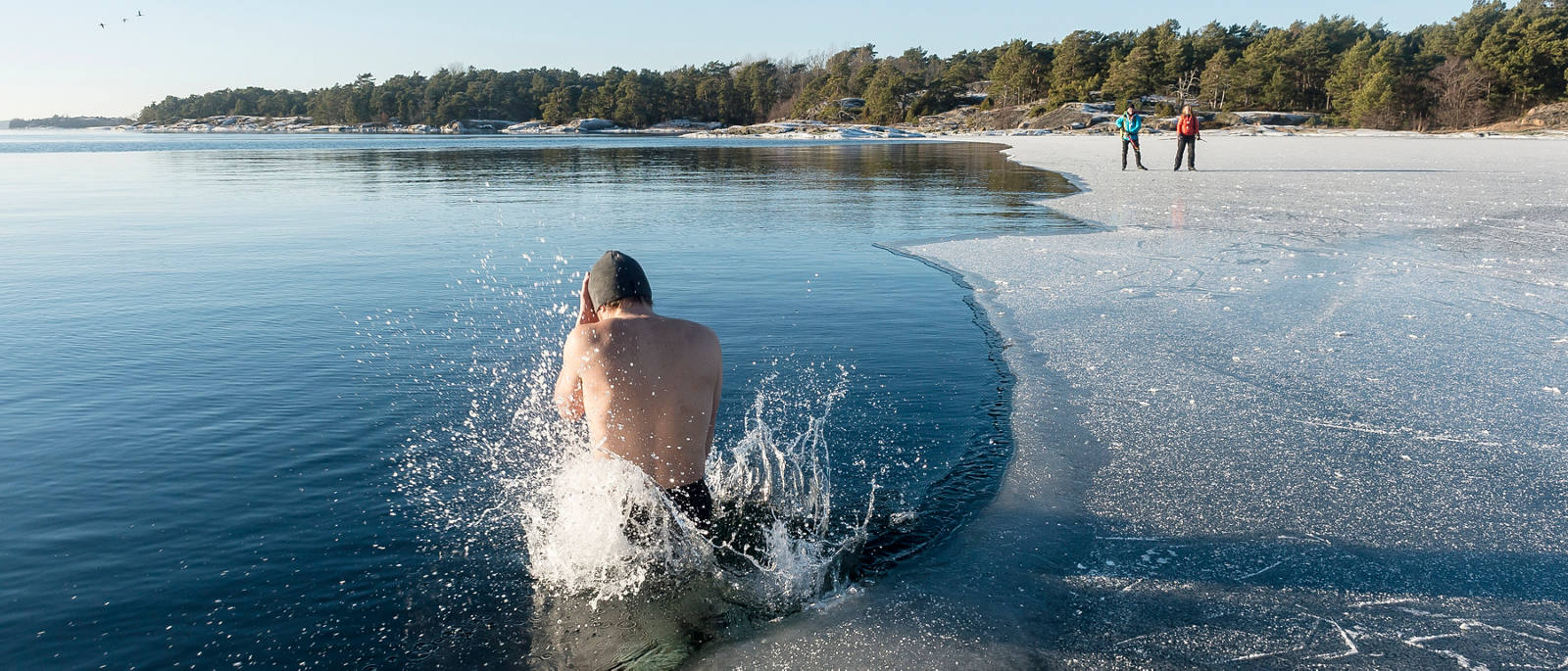
Cold water bathing: the effect on our immune system

Cold water bathing in winter has been a popular trend for years, and not only among the hardy. What is important to know and what we can learn from Wim Hof.
Is cold water bathing healthy?
Taking a plunge in cold water, even or especially in winter, is a trend that is growing in popularity by the year. Cold water bathing, which includes winter swimming and ice swimming, promises an array of health benefits, but what’s at the root of the practice and is it as healthy as practitioners claim? The answer isn't so simple. Even if hardy bathers enthuse about the positive effects of regular cold water swimming or cold showers, exposure to ice cold water also carries its risks.
Benefits of cold water bathing
Bathing in cold water activates the cardiovascular system and the breath. The body also releases adrenaline, which is partly responsible for making us feel refreshed and euphoric after a swim in cold water. The exhilaration and tingling sensation we feel as our body warms up fills us with energy and encourages many to expose themselves to this stimulus again and again.
Cold water bathing is also said to have other effects, albeit controversial:
-
Strengthens the immune system
-
Mental resilience
-
Faster regeneration
-
Activates fat burning (heat production, specifically in brown adipose tissue)
Cold water bathing: what are the risks?
The dangers resulting from submerging the body in cold water only seldom include hypothermia. Other phenomena such as cold shock or the inability to swim due to the body’s incapacitation can have dire consequences well before hypothermia sets in. But let's not be put off by the cold water too soon. By understanding the dangers, we can significantly reduce the risks by following a few guidelines.
Cold shock
Falling into cold water can lead to cold shock. The rapid cooling effect triggers several physiological reactions: we first take one deep breath (breathing reflex) and then begin to hyperventilate uncontrollably. Providing our head remains above water, there is no immediate danger. As long as no water is ingested during the breathing reflex, the cold shock stimulates our breathing, heart and blood pressure.
It’s good to know that the response to a cold shock wears off after about 2 to 3 minutes and can also be lessened with training.
Hypothermia
Hypothermia occurs when the body’s temperature drops below 35°C. How long it lasts depends on various factors such as water temperature, the individual (height, gender, fitness, fat percentage, etc.) and clothing. During the first three minutes in cold water, the skin cools down first. After this, the muscles and nerves close to the skin’s surface begin to cool too.
Wim Hof’s breathing technique
Wim Hof, also known as «The Iceman», is the inventor of a special breathing technique that is said to help strengthen the body or, more specifically, the body’s powers of resistance. The Dutch-born extreme athlete experiments with the effect of cold in combination with breathing techniques and yoga exercises. Even if his method is controversial, the combination of breathing exercises, cold temperatures and mental training is definitely useful for a strong immune system.
Preparing for cold water bathing
When it comes to cold water bathing, we’re talking of short periods in the water of up to 5 minutes at the most. However, ice swimmers who want to swim longer distances in winter need to be well prepared.
- Train your resistance to the cold
- Take regular short cold water swims – start with warmer temperatures and slowly progress to colder water
- In preparation, shower hot and cold alternately, aiming to control your breathing
- Mental training
- If you have any concerns or pre-existing conditions, contact your doctor beforehand
Safety tips
- Enter the cold water slowly to allow the body to get used to the cold
- Keep your head above water
- Don't swim alone and take a swimming aid (e.g. a buoy) with you
- After five minutes at the most, get out of the water and put on warm clothes
- Cover your head and hair: a lot of heat is lost through the head, especially when the hair is wet
- Warm up again slowly
When is the water too cold?
Experts warn against immersing the body in water with temperatures below 15°C, as potentially dangerous physiological reactions occur more frequently at around 10 to 15°C. However, at 35°C, our core body temperature is significantly higher which is why swimmers can still get hypothermia it they stay in waters below 35°C for too long.
Diving reflex
In cold water we can only hold our breath for about 10 seconds. In addition, when our head is under water, we experience what is called a diving reflex: our breathing, heart rate and blood pressure decrease. This puts excess pressure on the heart and circulation. People with pre-existing conditions should therefore seek medical advice before immersing themselves in cold water.



